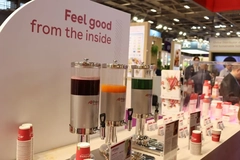Chemical in cruciferous foods could help repair DNA, prevents cancer- study

Study finds that a chemical called indol-3-carbonol (I3C) which occurs naturally in cruciferous vegetables boosts the activity of two genes, BRCA1 and BRCA2, which then work to detect and repair damaged DNA.
14/02/06 A Georgetown University study published this week in the latest issue of the British Journal of Cancer expands upon many other cancer studies by identifying and describing the cellular process which gives cruciferous foods, like cabbage and sauerkraut, a strong cancer-fighting response in the human body.
The study found that a chemical called indol-3-carbonol (I3C) which occurs naturally in cruciferous vegetables like broccoli, cauliflower, cabbage, and sauerkraut, boosts the activity of two genes, BRCA1 and BRCA2, which then work to detect and repair damaged DNA. Because damaged DNA can lead cells to become cancerous, eating foods that repair DNA, like sauerkraut, may lower the risk of cancer development.
"There have been many studies over the past few years, including studies done at the University of Illinois and the University of New Mexico, which show that eating sauerkraut can lower the risks of cancer by as much as 74 percent," said Ryan Downs, the co-owner of the Great Lakes Kraut Company -- the world's largest producer of naturally fermented sauerkraut. "But the Georgetown study is unique because it actually explains how the process works."
And according to Downs, naturally fermented sauerkraut may be even stronger in fighting cancer than raw cruciferous vegetables. A Finnish study completed in 2002 found the fermentation process that turns cabbage into sauerkraut breaks down the cancer-fighting chemicals in cabbage into simpler substances, which are even easier for the body to use.












